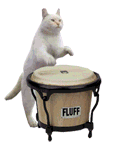View current page
...more recent posts

"Blowout (YT Remix)" [mp3 removed]
Audio remix of a YouTube posted to Nasty Nets [link removed].
Caveat: Some might describe this as "off color."
Since at least the '60s philosopher Walter Benjamin's essay "The Work of Art in the Age of Mechanical Reproduction" has been a favorite for conceptualist artists working with imagery to cite in support of their work whether it actually supports it or not. Benjamin's style is murky and delphic compared to say, Clement Greenberg's, making it easier for people to pick and choose suitable phrases from it, even though much of "WAAMR"'s content was aimed at a very specific set of political circumstances (the rise of fascism in the '30s--the print era) that would seem to make it inapplicable to someone making present day art. To the extent it is used as the basis for a discussion of multiples vs originals in the art market it is a blueprint for boredom, and not good boredom. That kind of talk is dull because it's mostly about money--the context here was Creative Commons licenses and how much freedom they give the artist to also sell work.
The "here" in the last sentence is a discussion over at Paddy Johnson's blog between artist Nathaniel Stern and commenter David McBride. McBride attempts to correct Stern's reading of the Benjamin essay and then they spend several paragraphs wrangling over what the essay means, both back in the day and now. It doesn't help that the two aren't speaking the same language: Stern uses "meme" as an adjective ("meme'd") and McBride thinks he means "copied"; Stern thinks "aura" as Benjamin uses it is a form of "value" (it was really more like "residue of religious power"). Then there's the question of whether "to exploit" is good or bad. These appear to be generational misunderstandings. In any case the back and forth is interesting, if only to convince you to stay out of Benjamin country and stick to something informative and fun like "Avant Garde & Kitsch."
More commentary on the 2007-2008 Rhizome.org commissions Considered as XYZ Art post. People aren't offering any specific examples of where the analysis fails, they're mostly just telling me to shut up.
you could also apply the XYZ method to art criticism: take artwork X, apply categorization schema Y, produce art review Z.
- anonymous (guest) 6-21-2007 3:52 pm
You could, but some specifics would help.
I'm not sure there are any categorization schema any more except the old reliable, "mere description."
- tom moody 6-21-2007 4:46 pm
Right. Then why are you using the XYZ schema to critique art? As a critical process, it is more reductionist than the creative processes that you are criticizing.
- anonymous (guest) 6-21-2007 5:12 pm
Well, we disagree, there.
I'm flattered if you think XYZ is a critical methodology, or as you say "categorization schema."
I think the point of your comments is that it would be better not to question the Rhizome commissions.
Either that or there are so many other ways of critiquing them being articulated out there that mine should be disregarded as the weakest alternative.
R--i-i-ight.
- tom moody 6-21-2007 6:02 pm








































































GIF by unknown artist X 72
Every Enemy is Al Qaeda Now
Bush and the U.S. press continue their collusive spin thing. Glenn Greenwald in Salon (may be behind subscription firewall):
That the Bush administration, and specifically its military commanders, decided to begin using the term "Al Qaeda" to designate "anyone and everyone we fight against or kill in Iraq" is obvious. All of a sudden, every time one of the top military commanders describes our latest operations or quantifies how many we killed, the enemy is referred to, almost exclusively now, as "Al Qaeda."
But what is even more notable is that the establishment press has followed right along, just as enthusiastically. I don't think the New York Times has published a story about Iraq in the last two weeks without stating that we are killing "Al Qaeda fighters," capturing "Al Qaeda leaders," and every new operation is against "Al Qaeda."
The Times -- typically in the form of the gullible and always-government-trusting "reporting" of Michael Gordon, though not only -- makes this claim over and over, as prominently as possible, often without the slightest questioning, qualification, or doubt. If your only news about Iraq came from The New York Times, you would think that the war in Iraq is now indistinguishable from the initial stage of the war in Afghanistan -- that we are there fighting against the people who hijacked those planes and flew them into our buildings: "Al Qaeda."
